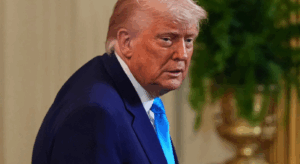Cailian Press reported on May 22 (Editor: Huang Junzhi) that Jamie Dimon, CEO of JPMorgan Chase, known as the “No. 1 on Wall Street,” warned again on Thursday that he cannot rule out the possibility of the US economy falling into stagflation. The US economy faces huge risks, such as geopolitics, fiscal deficits, and price pressures.
Dimon expressed the above views at the JPMorgan Global China Summit held in Shanghai that day. “I don’t think we’re in the best position,” he said in an interview with the media. “The Fed is right to take a wait-and-see approach before deciding on monetary policy.”
Since the beginning of this year, US President Trump’s indiscriminate use of the “tariff stick” has made the economic outlook uncertain. The Federal Reserve has adopted a wait-and-see attitude, keeping interest rates unchanged. Officials believe the risks of rising inflation and unemployment are increasing.
St. Louis Fed President Alberto Musalem noted this week that the tariff program may have been scaled back but it “still appears likely to have a significant impact on the near-term economic outlook,” with “direct one-time effects on the prices of imported final goods, indirect effects on the prices of domestically produced goods and services, and possible second-round effects on inflation.”
He added that assuming that the effects of inflation would fade on their own “runs the risk of underestimating the level and persistence of inflation” and causing more inflation problems in the future.
Dimon stressed, “I think the likelihood of rising inflation and stagflation is slightly higher than some people think.”
Earlier this week, he warned that markets and central bankers underestimated the risks of record U.S. deficits, tariffs, and international tensions. He believes the risk of rising inflation or even stagflation is not adequately reflected in stock market values.
“I think people are feeling pretty good about themselves because you haven’t seen the actual impact of the tariffs yet. The market went down 10% and then went back up 10%. There’s an extraordinary level of complacency. We have massive deficits; we have a central bank that seems to me to be almost complacent. You all think they can handle this. I don’t think they can,” he said.
In the latest interview, Dimon also mentioned the Sino-US trade friction, and commented: “I don’t think the US government wants to decouple from China. I hope they have a second, third, or fourth round (of negotiations), and I hope they can end in a good place.”
Earlier this month, China and the United States “reduced tariffs on each other” after talks in Geneva, marking an easing of trade frictions between the world’s two largest economies, sending a positive signal to the world, and easing market tensions. The United States will reduce tariffs on Chinese goods from 145% to 30% within 90 days, and China will reduce its tariffs from 125% to 10% during the same period.
On the other hand, Dimon added that the U.S. must “address its deficit problem,” and he understands why investors might cut back on dollar assets.
“I’m not worried about short-term volatility in the dollar. But I do understand that people may be reducing their holdings of dollar assets,” he added.



+ There are no comments
Add yours